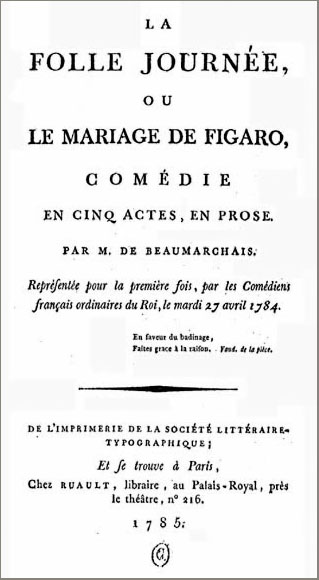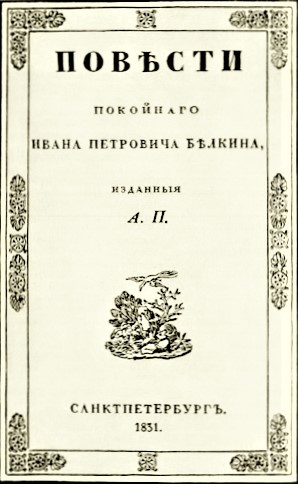
The Barber of Seville or the Useless Precaution is a French play by Pierre Beaumarchais, with original music by Antoine-Laurent Baudron. It was initially conceived as an opéra comique, and was rejected as such in 1772 by the Comédie-Italienne. The play as it is now known was written in 1773, but, due to legal and political problems of the author, it was not performed until February 23, 1775, at the Comédie-Française in the Tuileries. It is the first play in a trilogy of which the other constituents are The Marriage of Figaro and The Guilty Mother.

The Good Soldier: A Tale of Passion is a 1915 novel by the British writer Ford Madox Ford. It is set just before World War I, and chronicles the tragedy of Edward Ashburnham and his seemingly perfect marriage, along with that of his two American friends. The novel is told using a series of flashbacks in non-chronological order, a literary technique that formed part of Ford's pioneering view of literary impressionism. Ford employs the device of the unreliable narrator to great effect, as the main character gradually reveals a version of events that is quite different from what the introduction leads the reader to believe. The novel was loosely based on two incidents of adultery and on Ford's messy personal life.

The Marriage of Figaro is a comedy in five acts, written in 1778 by Pierre Beaumarchais. This play is the second in the Figaro trilogy, preceded by The Barber of Seville and followed by The Guilty Mother.

Poirot's Early Cases is a short story collection written by Agatha Christie and first published in the UK by Collins Crime Club in September 1974. The book retailed at £2.25. Although the stories contained within the volume had all appeared in previous US collections, the book also appeared there later in 1974 under the slightly different title of Hercule Poirot's Early Cases in an edition retailing at $6.95.

Soledad Rendón Bueno, better known by her stage names Soledad Miranda or Susann Korda, was an actress and pop singer who was born in Seville, Spain. She starred in several erotic thriller films directed by Jess Franco in 1969 and 1970, such as Count Dracula (1970) and Vampyros Lesbos (1970).

The Guilty Mother, subtitled The Other Tartuffe, is the third play of the Figaro trilogy by Pierre Beaumarchais; its predecessors were The Barber of Seville and The Marriage of Figaro. This was the author's last play. It is rarely revived. Like the earlier plays of the trilogy it has been turned into operatic form, but it has not entered the general opera repertoire.

Arabella, Op. 79, is a lyric comedy, or opera, in three acts by Richard Strauss to a German libretto by Hugo von Hofmannsthal, their sixth and last operatic collaboration.

"White Nights" is a short story by Fyodor Dostoevsky, originally published in 1848, early in the writer's career.

The Man Upstairs is a collection of short stories by P. G. Wodehouse, first published in the United Kingdom on 23 January 1914 by Methuen & Co., London. Most of the stories had previously appeared in magazines, generally Strand Magazine in the UK and Cosmopolitan or Collier's Weekly in the United States. Although the book was not published in the US, many of the stories were eventually made available to US readers in The Uncollected Wodehouse (1976) and The Swoop! and Other Stories (1979).

Caramelo is a 2002 epic novel spanning a hundred years of Mexican history by American author Sandra Cisneros. It was inspired by her Mexican heritage and childhood in the barrio of Chicago, Illinois. The main character, Lala, is the only girl in a family of seven children and her family often travels between Chicago and Mexico City. Because Cisneros also has six brothers and her family moved frequently when she was a child, the novel is semi-autobiographical. The novel could also be called a Bildungsroman, as it focuses on Lala's development from childhood onward. It was shortlisted for the 2004 International Dublin Literary Award.

The Tales of the Late Ivan Petrovich Belkin is a series of five short stories and a fictional editorial introduction by Russian author Aleksandr Pushkin. The collection is opened with the editorial, in which Pushkin pretends to be the verbose publisher of Belkin's tales. The tales themselves are not related to one another, except that they are all said in the introduction to be stories told by various people to a recently deceased landowner, Ivan Petrovich Belkin. The introduction continues to say that Belkin was an interesting and mysterious man, even to the point that the woman he left his estate to had never met him. It is also mentioned that Belkin's favorite pastime was to collect and hear stories, several of which are to be presented to the reader.

The Razor's Edge is a 1946 American drama film based on W. Somerset Maugham's 1944 novel of the same name. It stars Tyrone Power, Gene Tierney, John Payne, Anne Baxter, Clifton Webb, and Herbert Marshall, with a supporting cast including Lucile Watson, Frank Latimore, and Elsa Lanchester. Marshall plays Somerset Maugham. The film was directed by Edmund Goulding.

Quartet is a 1948 British anthology film with four segments, each based on a story by W. Somerset Maugham. The author appears at the start and end of the movie to introduce the stories and comment about his writing career. It was successful enough to produce two sequels, Trio (1950) and Encore (1951), and popularised the compendium film format, leading to films such as O. Henry's Full House in 1952.

The Painted Veil is a 1934 American drama directed by Richard Boleslawski and starring Greta Garbo. The film was produced by Hunt Stromberg for Metro-Goldwyn-Mayer. Based on the 1925 novel The Painted Veil by W. Somerset Maugham, with a screenplay by John Meehan, Salka Viertel, and Edith Fitzgerald, the film is about a woman who accompanies her new husband to China while he conducts medical research. Feeling neglected by her husband, the woman soon falls in love with a handsome diplomatic attaché. The film score was by Herbert Stothart, the cinematography by William H. Daniels, the art direction by Cedric Gibbons, and the costume design by Adrian. The film earned $1,658,000 at the box office.

The Painted Veil is a 1925 novel by British author W. Somerset Maugham. The title is a reference to Percy Bysshe Shelley's 1824 sonnet, which begins "Lift not the painted veil which those who live / Call Life".

The Casuarina Tree is a collection of short stories by W. Somerset Maugham, set in the Federated Malay States during the 1920s. It was first published by the UK publishing house Heinemann on September 2, 1926. The first American edition was published on September 17, 1926 by George H. Doran. It was re-published by Collins in London under the title The Letter: Stories of Crime. The book was published in French translation as Le Sortilège Malais (1928) and in Spanish as Extremo Oriente (1945).

Seven Gothic Tales is a collection of short stories by the Danish author Karen Blixen, first published in 1934, three years before her memoir Out of Africa. The collection, consisting of stories set mostly in the nineteenth century, contains her tales "The Deluge at Norderney" and "The Supper at Elsinore".

Lady Frederick is a comedy by the British writer W. Somerset Maugham, written early in his career. The play was first seen in London in 1907, and was very successful, running for 422 performances. The title role was played by Ethel Irving. In New York it was first performed in 1908, with Lady Frederick played by Ethel Barrymore, who reprised her role in the play's film adaptation, The Divorcee.

The Mixture as Before is a collection of 10 short stories by the British writer W. Somerset Maugham, first published by William Heinemann in 1940.
The Trembling of a Leaf: Little Stories of the South Sea Islands is a collection of short stories by W. Somerset Maugham, first published in New York in 1921 by the George H. Doran Company.



















